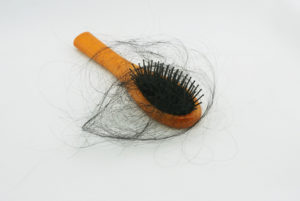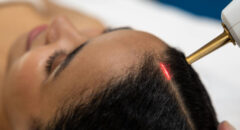
Most black women can attest to learning at a young age that their hair is their crowning glory, so it’s not hard to imagine how traumatizing it can be to learn that black women are losing their hair at rapid rates, according to recent study findings.
Studies suggest a significant portion of middle-aged African-American women feel their hair is “unhealthy". This could be due to experiences involving hair care and styling. These concerns lead many to avoid exercise in efforts to protect their existing hair.
Hair units offer styling versatility. They can be used as a means to protect the hair.
But scalp experts warn against toeing the line between protection and harm, i.e. traction alopecia.
Common Reason Black Women Are Losing Hair
Traction alopecia is caused by inflammation of the follicle when the hair is being pulled too tight for too long. It is s common form of hair loss that dermatologists see in the Black community.
Tightly coiled hair is also prone to breakage. Because of bends in the hair, oil from the scalp can’t travel down the length of the shaft. This prevents the strand from being naturally protected.
Losing Hair May Happen Over a Period of Time
Hair loss usually occurs in phases. Small bumps developed around the follicle, also known as traction folliculitis, are a signal for eventual hair loss.
The subsequent thinning, or traction alopecia, can still be reversed at this point. After that, it can happen when the follicle is put under long-term tension. It scars over. Then, hair stops growing permanently. This is an example of scarring alopecia.
Braids, wigs, and extensions can be worn safely. They are not the direct cause of hair loss.
Too much tension on the hair causes follicles to become inflamed. That's when hair breaks.
Women may notice hair loss but feel trapped in a cycle of wearing extensions to cover it.
Treatments to Consider If You Are Losing Hair
Although traction alopecia is a devastating condition, it can be treated.
One method is steroid injections. Traction alopecia is caused by inflammation. You can use a compound with minoxidil that helps growth. In other words, this is a steroid. Add a little bit of tretinoin to help it all penetrate.
Platelet-rich plasma therapy, in which growth factors from the patient’s blood are injected into the scalp, can also stimulate hair growth as well.
Another remedy is to refrain from wearing tension-heavy styles that cause alopecia. This is only temporary.
Instead, smaller, consistent changes work as well. Giving the hair a 3 to 4-week break and using essential oils including thyme, rosemary, cedarwood, and peppermint helps as well.
With consistency, hair regrowth can happen and your edges can return!






